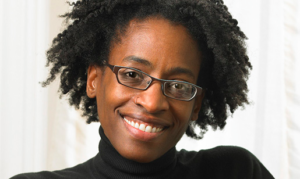
After her beautifully delivered acceptance speech, host Daniel Handler, who writes under the pen name Lemony Snicket, took the stage to inform everyone how ridiculous it was that the author was allergic to watermelon.
He continued, saying:
“I am only writing a book about a Black girl who is allergic to watermelon if I get a blurb from [Woodson], Cornel West, Toni Morrison and Barack Obama, saying, ‘This guy’s okay! This guy’s fine.'”
Rather than take to Twitter or bash Handler verbally, Woodson graciously did what she does best: Write about it.
The award-winning author wrote an essay in the New York Times titled “The Pain of the Watermelon Joke.”
In it, she describes the history behind her disdain for the seedy fruit she’d once enjoyed and grew to be allergic to.
“I was a brown girl growing up in the United States,” she says. “By that point in my life, I had seen the racist representations associated with African-Americans and watermelons, heard the terrifying stories of black men being lynched with watermelons hanging around them, watched black migrants from the South try to eke out a living in the big city by driving through neighborhoods like my own — Bushwick, in Brooklyn — with trucks loaded down with the fruit.”
She went on to describe how maybe her revulsion to the fruit was a little more than just allergies.
“Perhaps my allergy was actually a deep physical revulsion that came from the psychological impression and weight of the association. Whatever it was, I could no longer eat watermelon.”
The short joke, that might have been nothing but a blip on the radar for Handler, took Woodson back to a place she thought she’d left behind.
“In a few short words, the audience and I were asked to take a step back from everything I’ve ever written, a step back from the power and meaning of the National Book Award, lest we forget, lest I forget, where I came from. By making light of that deep and troubled history, he showed that he believed we were at a point where we could laugh about it all. His historical context, unlike my own, came from a place of ignorance,” she wrote.
Woodson has dedicated her career to writing stories to combat these issues and give a narrative to people that are so often overlooked.
“This mission is what’s been passed down to me — to write stories that have been historically absent in this country’s body of literature, to create mirrors for the people who so rarely see themselves inside contemporary fiction, and windows for those who think we are no more than the stereotypes they’re so afraid of,” she writes. “To give young people — and all people — a sense of this country’s brilliant and brutal history, so that no one ever thinks they can walk onto a stage one evening and laugh at another’s too often painful past.”


